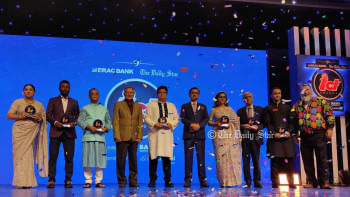Home for Hindu orphans

The Dhaka Orphanage Society (Hindu), located in a narrow Farashganj road, is facing numerous challenges that have drawn attention to its neglected state.
There's an illegal truck parking right in front of its main gate, and the surrounding area is strewn with garbage.
Despite these unfavourable conditions, the Dhaka Orphanage Society (Hindu) remains as the only shelter for Hindu orphans in Dhaka, providing a safe haven for children without guardians.
During a recent visit, it was observed that both the interior and exterior of the building have deteriorated over time. Additionally, local traders have been indiscriminately dumping waste around the premises.
HISTORY OF ORPHANAGE SOCIETY
This is one of the oldest orphanages in Dhaka and was established to cater to orphaned Hindu children and teenagers. In 1908, the orphanage home was founded on 60 percent of a three-acre land granted by the government on Orphanage Road, adjacent to Bakshibazar.
Rani Rashmoni provided significant support to the institution in 1936-37 while its later patrons included Manik Ghosh, Utpal Roy, Swadesh Debnath, Binoy Ghosh, Kalidas Baidya, and Sudhanshu Shekhar Halder.
Due to communal riots, the orphanage was relocated to the Farshganj residence of local landlord Gokul Chandra Sen in 1950. In 1962, the institution was registered with the Ministry of Social Welfare under the Hindu Act (238/1962 Ordinance-1961).
Rani Mitra joined as the female caretaker in 1965.
During the Liberation War, the orphanage home suffered looting of its documents. However, after independence, it was reopened under the initiative of Rani Mitra.
In the 1980s, a five-story building was constructed with a grant from the Norway-Bangladesh Association. Until 1990, the organisation received grants from the World Food Program.
Currently, the orphanage accommodates a total of 89 orphans -- 62 girls and 27 boys. The facility employs six teachers. The authority provides three meals a day, including vegetarian meals in the morning and evening, meat on Fridays, eggs on Mondays, and fish on other days for lunch. The children are also provided with new clothes during festivals and school uniforms, said Kalipada Saha, the superintendent of the orphanage home.
Fifteen-year-old Karen Kha Tripura, who has been residing in the orphanage for over nine years, said, "It's a great opportunity for children like us to live in a caring atmosphere."
Kalipada Saha said, "We work tirelessly for the children living here. We require nearly Tk 40 lakh annually, which is contributed by the government, donors, and society members. However, more funds are needed to improve our services."
About the condition of the building, he said, "We are working on it."


 For all latest news, follow The Daily Star's Google News channel.
For all latest news, follow The Daily Star's Google News channel. 



Comments